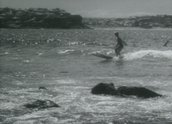
All Quiet on the Surfie-Rocker Front (1963)
Synopsis
At Manly in 1963, police step up patrols to curb gang violence between surfers and ‘rocker’ groups from the outer suburbs. The narration says that there have been fights almost every weekend between rival gangs, and there is a threat of ‘large-scale gang war’. Police meet ferries arriving from the city and follow groups of youths walking the streets, as young surfers take to the water, in an attempt to catch waves, rather than fight. A group of young rockers sits on the rocks, smoking cigarettes and looking surly.
Curator’s notes
Australia changed quickly after the introduction of television in 1956, but the roots of this conflict go back further, to the immediate postwar period. Young Australian seamen had begun dressing like American servicemen in the last year of the war, even adopting American accents. A small group around Woolloomooloo in Sydney were involved in the black-market sale of clothing, just after the war. They became known as ‘bodgies’, the girls as ‘widgies’. They dressed in American styles, grew their hair (if boys) and cut it short (if girls).
The origin of the word bodgie goes back centuries, to the English verb ‘to bodger’, meaning to do a bad job, or fake something, ‘bodge something up’. By 1945, in Australia, a bodger was military slang for a shirker. Much of the clothing the bodgies sold on the black market was alleged to be fake, or bodged up. By the late 1950s, the trend had morphed, with the arrival of American teen movies and rock’n’roll music. The media called these young people ‘rockers’.
In 1962, Manly surfer Midget Farrelly won the unofficial world championship of surfing, the Makaha contest in Hawaii. He became an instant celebrity in Australia, just as the new craze of surf music was taking off. Hollywood had discovered surfing already, and the Gidget movies had reached Australia shortly after their US debut in 1959. American surf music groups, led by the Californian musician Dick Dale, had started to record a distinctive kind of twangy rock’n'roll, and The Beach Boys recorded their first album in 1962. Surfing and music were now connected, at least in media shorthand.
The conflict between surfers – who hated the term ‘surfies’ – and rockers was in a sense inevitable, because rockers had been around longer, and they felt the same sense of entitlement to the beaches as all Australians. That was part of the premise of Australian beach culture: equality of access.
At the root of this tension, there is a class division: rockers were working class, and saw surfers as different, although many surfers were just as working class, and just as willing to stake a claim to territory. This conflict did not disappear, even if the subcultures became less distinguishable. The 2005 Cronulla riots have their origins in the same tensions – ‘westies’ clashing with surfers, with the added tension of anti-Muslim sentiment after the 11 September 2001 attacks in the US.
All Quiet on the Surfie-Rocker Front screened as one of five segments in the Cinesound Review, No. 1637, in 1963.
- Overview
- Curator’s notes
- Video full title
- Principal credits
- Find a copy
- Make a comment
- Map
- Add your review



